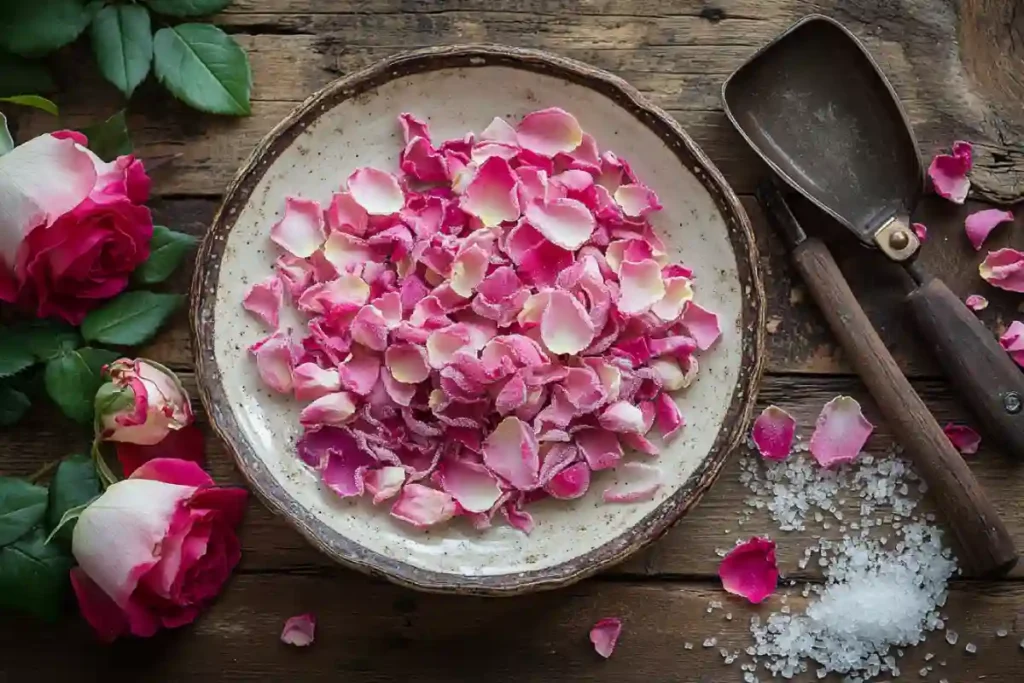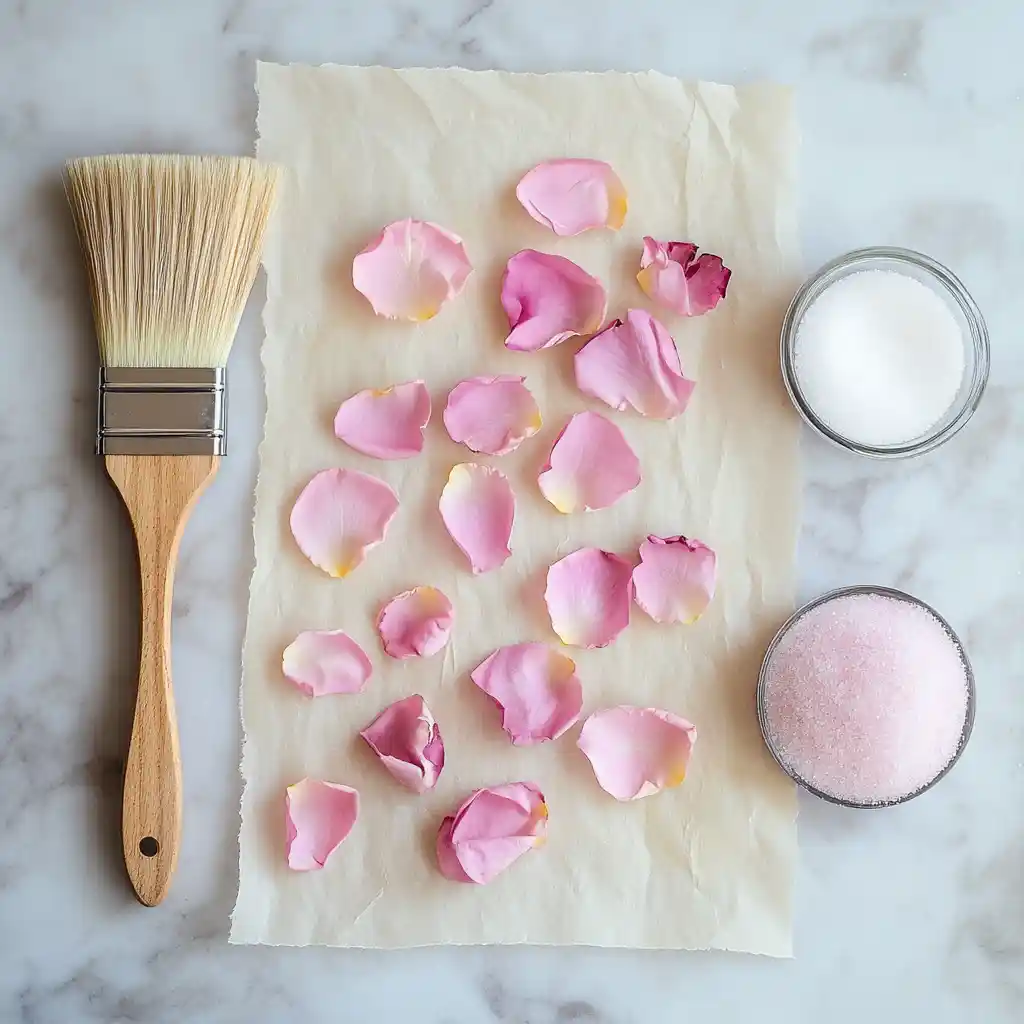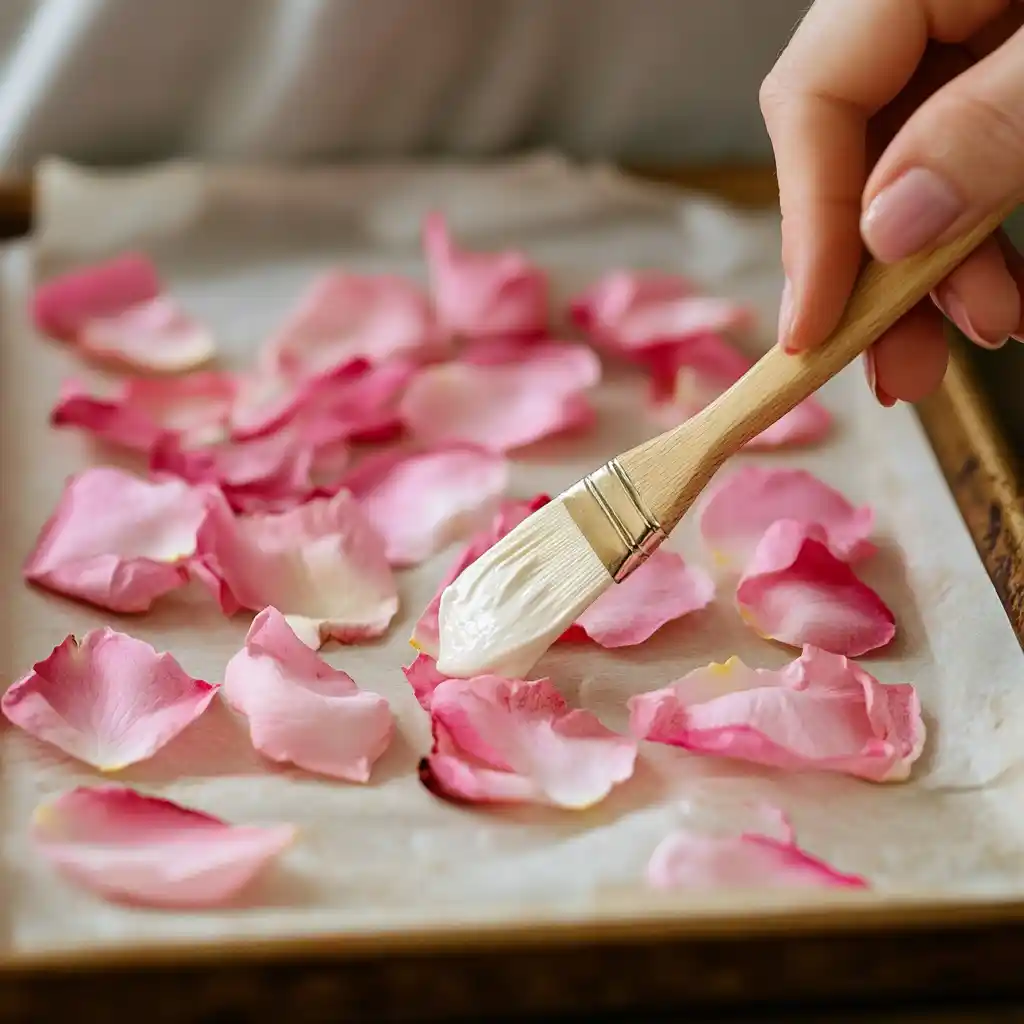
Table of Contents
Candied rose petals have a timeless kind of magic—delicate, crisp, and kissed with just the right amount of sweetness. I remember the first time I made them: a quiet Sunday morning, a basket of freshly picked petals from a friend’s garden, and a curiosity that turned into obsession. Once coated in sugar and left to dry, those petals transformed into tiny edible gems that added elegance to even the simplest desserts.
This article will show you exactly how to make candied rose petals at home using natural ingredients. We’ll cover how to choose the right petals, the step-by-step process to crystalize them, how to store them properly, and creative ways to use them in your everyday plant-based cooking. It’s simpler than you might think—and more beautiful than you can imagine.
The Story Behind Candied Rose Petals
Why Edible Flowers Are Worth Savoring
Edible flowers like rose petals are more than just pretty—they’ve been used in cooking and medicine for centuries. My first experience with edible blooms came through rose petal syrup, a soft and floral addition to sparkling water that inspired me to keep experimenting. When I discovered candied rose petals, it felt like unlocking a forgotten culinary secret. They aren’t just beautiful; they’re deeply rooted in traditions from Persian, Indian, and Victorian cuisines, where flowers signified celebration and care.
Whether you’re topping a vegan lemon tart or steeping them into a tea, candied rose petals can add both texture and flavor in ways no artificial sprinkle ever could. And they’re surprisingly simple to make.
What You’ll Need to Make Candied Rose Petals
You don’t need fancy equipment, but you do need the right kind of rose petals: organic, unsprayed, and preferably just picked. Here’s what I always keep on hand:
| Ingredient | Why It Matters |
|---|---|
| Fresh organic rose petals | Ensure they’re edible and chemical-free |
| Aquafaba (or 1 egg white if not vegan) | Helps the sugar adhere to petals |
| Fine organic cane sugar | Gives the petals a crystal coating |
| A clean, soft brush | Used to apply the aquafaba gently |
Pro tip: If you’ve already tried ice cream with rose petals, you know the floral flavor is delicate—so resist the urge to overdo the sugar. The goal is subtle, not saccharine.
For those new to botanical recipes, check out rose petal lemonade for another beginner-friendly floral treat you can sip alongside your candied creations.
Crystallizing Rose Petals at Home: What You’ll Need and How to Do It
Gathering the Ingredients
Before you start, make sure you’ve got fresh, edible petals—ideally organic and free of pesticides. The variety of rose doesn’t matter as much as its scent and color. Choose fragrant, richly colored ones for the best results.

Here’s everything you’ll need:
- 1 cup fresh organic rose petals (washed and patted dry)
- 2 tablespoons aquafaba (or 1 egg white if not vegan)
- ½ cup fine organic cane sugar
- 1 small soft brush (like a clean paintbrush)
- Parchment paper
- A baking sheet or drying rack
Step-by-Step Instructions
- Prep your petals. Gently rinse the rose petals under cool water and pat them completely dry. Moisture will prevent the sugar from sticking, so take your time with this step.
- Whip the aquafaba. If using aquafaba (the liquid from canned chickpeas), whip it lightly until slightly foamy. This helps it mimic the texture of egg white and ensures the sugar adheres.
- Brush each petal. Use the soft brush to lightly coat both sides of a petal with the foamed aquafaba. Work with one petal at a time for best control.
- Dust with sugar. Sprinkle cane sugar over the petal until fully coated. Gently shake off any excess.
- Let them dry. Place each sugared petal on parchment paper and let them air-dry for 12 to 24 hours in a cool, dry area. They should feel crisp when ready.

Creative Ways to Use Candied Rose Petals in Everyday Recipes
Elevating Sweet Plant-Based Creations
Once your candied rose petals are crisp and ready, the fun really begins. These delicate little gems aren’t just pretty—they’re versatile. From afternoon tea spreads to show-stopping cakes, they instantly elevate the visual appeal and add a light floral crunch.
Here are some tasty suggestions to help you begin:
- Cake toppers: Sprinkle them over frosted layer cakes or cupcakes for a romantic finish.
- Tea party treats: Use them to decorate vegan scones, shortbread, or lemon bars.
- Chocolate bark: Press them into melted dark chocolate before it sets for a gorgeous botanical twist.
- Ice cream accents: Top off your homemade scoops with a few petals to impress guests and add subtle flavor.
Pairing them with something like rose petal syrup or floral-infused beverages makes for an elegant and cohesive menu. These ideas work beautifully for birthdays, brunches, or anytime you want to make something feel extra special.
Surprising Savory and Decorative Uses
Candied rose petals aren’t just for dessert. Their sweet, perfumed crunch can play a supporting role in more unexpected ways, especially when used mindfully.
- Salad garnishes: Add them to an arugula and citrus salad for color and contrast.
- Cheese board flair: Serve them alongside plant-based cheeses and fruit for a luxurious charcuterie effect.
- Gift box filler: Tuck a few into handmade chocolate boxes or edible gift kits.
- Table styling: Scatter dried petals across a table runner or charcuterie board for a natural, edible decoration.
If you’ve experimented with floral flavors like those in our ice cream with rose petals, you already know how well roses pair with creamy, acidic, and even tangy notes.
Storing Candied Rose Petals and Avoiding Common Mistakes
How to Store Candied Rose Petals the Right Way
Once your candied rose petals are fully dry and crisp, storing them correctly will help preserve their texture and flavor. Exposure to moisture is the biggest threat—these beauties are delicate and can go soggy fast if kept in the wrong environment.
Here’s a quick breakdown of storage do’s and don’ts:
| Storage Tip | Why It Matters |
|---|---|
| Store in airtight glass jars | Keeps humidity out and preserves crispness |
| Keep in a cool, dry pantry | Prevents melting or moisture buildup |
| Layer with parchment paper | Stops petals from sticking together |
| Use within 3–4 weeks | Freshest taste and texture in the first month |
For extended shelf life, you can also dehydrate them in a low-temp oven for 10 minutes, especially if your kitchen is humid. Just be careful not to burn the sugar.
Troubleshooting Tips for First-Time Makers
It’s normal to have a few hiccups the first time. Here’s how to fix common issues:
- Petals are sticky, not crisp? They may not have dried fully. Let them air-dry another day or use a dehydrator on the lowest setting.
- Sugar won’t stick? Check that your aquafaba (or egg white) isn’t too watery. It should be lightly foamy when applied.
- Petals curling or browning? That usually means your environment is too warm or you applied too much liquid. Less is more.
For additional information on safe edible flowers and proper handling, this Edible Flowers Guide offers clear, science-backed advice.
FAQs About Candied Rose Petals
Can you eat candied rose petals?
Yes, absolutely! Candied rose petals are edible and delicious—provided you use organic, pesticide-free roses. They’re often used as garnishes for cakes, pastries, and even cocktails. The light floral flavor combined with the crisp sugar coating makes them a standout addition to both sweet and savory recipes.
How do you crystalize rose petals?
Crystallizing rose petals is a simple process that involves coating each petal with a thin layer of aquafaba (or egg white), dusting them with fine sugar, and letting them dry completely. After 12–24 hours, they become crisp and glossy, transforming into beautiful candied rose petals perfect for decorating.
How to make candied petals?
To make candied petals, start by gently cleaning organic edible petals and letting them dry. Brush them with aquafaba, sprinkle with sugar, and let them dry on parchment paper. The technique is similar for other edible flowers like violets or pansies. Follow the same steps and enjoy endless decorative options.
How to make edible rose petals at home?
To make edible rose petals at home, first source organic roses. Gently remove the petals, rinse them with care, and blot them dry. You can use them fresh in teas and salads, or candy them as detailed in this guide. Homemade edible petals offer fresher flavor and full control over ingredients.
Conclusion: Let Your Kitchen Bloom with Candied Rose Petals
Candied rose petals aren’t just a garnish—they’re a story. A story of beauty, patience, and bringing nature’s elegance into your kitchen. Whether you’re dressing up a dessert, adding flair to a salad, or crafting edible gifts, these petals are a creative, plant-based way to surprise and delight. They’re simple to make, beautiful to look at, and entirely unforgettable.
Print
Candied Rose Petals
- Total Time: 15 minutes + drying time
- Yield: 1 cup 1x
- Diet: Vegan
Description
These vegan candied rose petals are crisp, lightly sweet, and perfect for decorating desserts or stirring into tea. Made with simple ingredients and no artificial additives.
Ingredients
1 cup fresh organic rose petals
2 tablespoons aquafaba (or 1 egg white)
½ cup organic cane sugar
Soft brush (like a clean paintbrush)
Parchment paper
Tray or drying rack
Instructions
1. Rinse and pat dry the rose petals completely.
2. Whip aquafaba until slightly foamy.
3. Using a soft brush, coat each petal with aquafaba.
4. Dust both sides of the petal with sugar.
5. Place on parchment paper and air-dry for 12–24 hours.
Notes
Store in an airtight glass jar in a cool, dry place.
Use within 3–4 weeks for best texture.
Perfect for decorating cakes, cupcakes, and tea blends.
- Prep Time: 15 minutes
- Cook Time: 0 minutes
- Category: Dessert Garnish
- Method: No-bake
- Cuisine: Botanical
Nutrition
- Serving Size: 4–6 petals
- Calories: 20
- Sugar: 4g
- Sodium: 0mg
- Fat: 0g
- Saturated Fat: 0g
- Unsaturated Fat: 0g
- Trans Fat: 0g
- Carbohydrates: 5g
- Fiber: 0g
- Protein: 0g
- Cholesterol: 0mg
Keywords: candied rose petals, edible flowers, rose recipes
